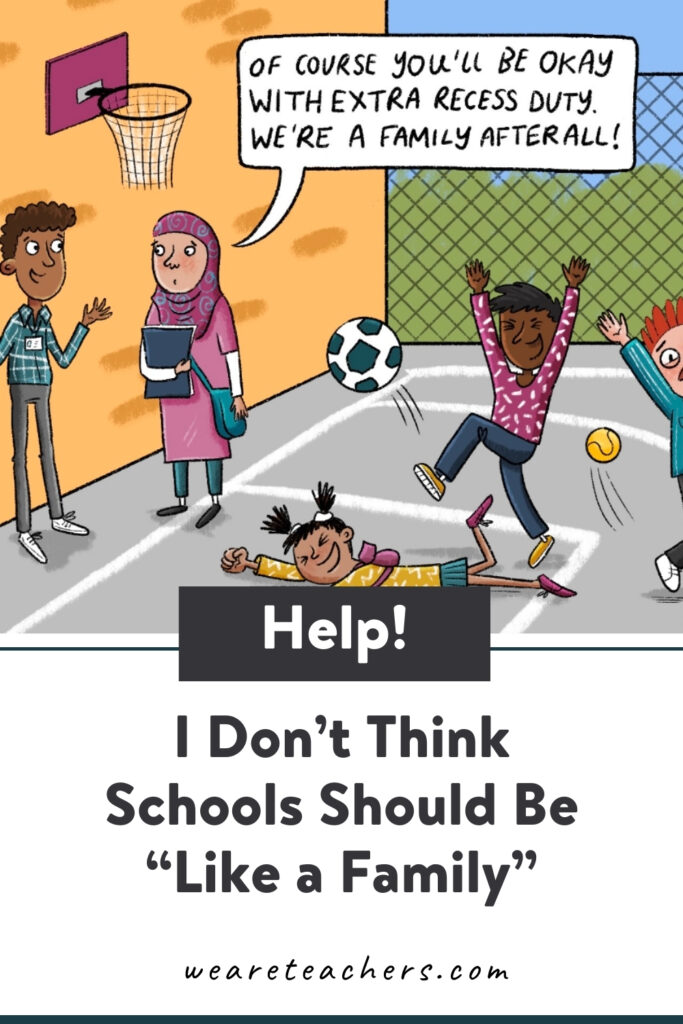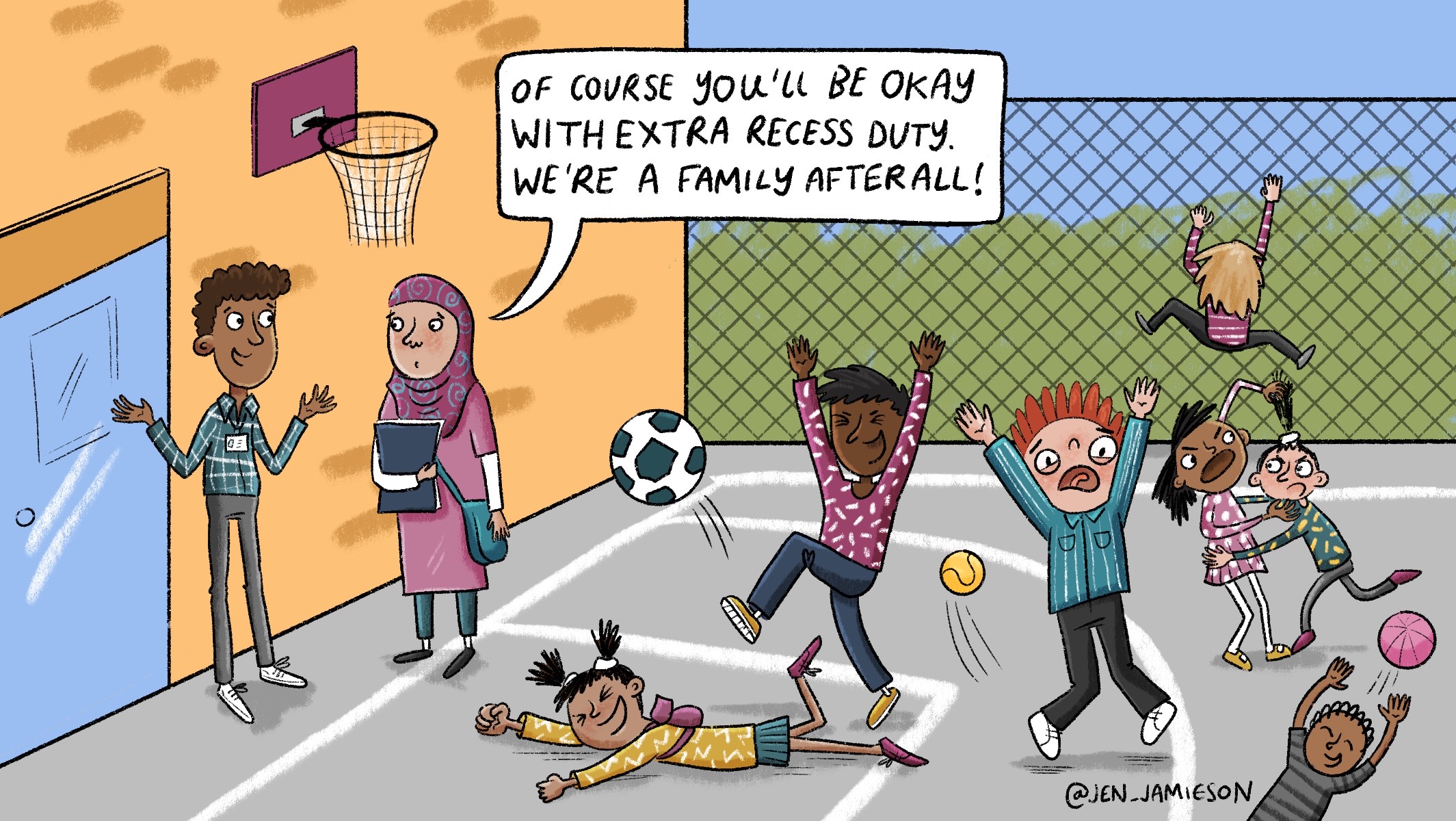Dear We Are Teachers,
I was interviewing for a new position this week, and the interviewer said over and over how their school is “like a family.” This phrase has always rubbed me the wrong way, and I told him so. Four hours later, I got a rejection email saying I’m “not a good culture fit.” What? Since when are we supposed to have the same intimacy level at work as we do in our own families?
—not your fam
Dear N.Y.F.,
Yeah, schools need to stop using this comparison.
I know schools say this with positive intentions. They want to communicate certain positive ideals about the way they operate. But sometimes, “we’re a family” can be used to exploit teachers’ goodwill. The issue boils down to this: Not all families are healthy families.
Let me tell you about two different schools I worked at, both of which I would say were “like a family.”
How school #1 was “like a family”:
- We anticipated each other’s needs and filled in where we could, knowing there would be times we would need support in return.
- We all fully trusted our principal and knew she wanted what was best for each of us, personally and professionally.
- There was a deep respect for each other, even in conflict and disagreement.
- I knew I could depend on my coworkers and administrators and vice versa.
How school #2 was “like a family”:
- We had a deeply unhinged matriarch who offered to reward us for ratting on our “siblings.”
- Anyone who challenged the matriarch’s authority was grounded, so to speak.
- The matriarch had definite favorites, creating a culture of fear and secrecy.
- They expected 100% compliance on things way beyond our job description.
- There was lots of unethical stuff happening below the surface.
See? Now you know why I still shudder when I hear school #2 mentioned conversationally.
Even though schools need to drop the family metaphor, I don’t think this phrase is always indicative of a toxic culture.
Was the place where you interviewed comprised of a good family or a bad family? I guess you won’t know. Maybe next time, see what you can gather by saying, “I would love to hear more about how you’re a family. What does that mean at your school?”
Dear We Are Teachers,
ADVERTISEMENTI have a new 8th grader this semester whose parent is a friend of mine in our neighborhood. The first few weeks were fine, and my friend was thrilled that “finally, a teacher understands our Zane!” But now, behaviors are starting to emerge that show me why he’s had such a hard time. He argues back about the littlest things (like why he can’t write in highlighter), says rude things to his classmates (like pointing out another student’s shoes are Chinese knockoffs of a more popular brand), and gets very riled up in response to criticism. How do I tell my neighborhood friend that she hasn’t had a string of bad teachers—Zane is the common denominator?
—It’s you, hi, you’re the problem, it’s you
Dear I.Y.H.Y.T.P.I.Y.,
Ooh, yikes. How about you don’t say anything and hire a paid lookalike to replace you for the rest of the teaching year.
But if you don’t have the cash to hire that actor, here’s what you do.
“Lisa, I want to talk to you about something. First of all, Zane is a good kid and I’m thrilled he’s in my class. There are a couple of soft skills I want to work on with him one-on-one. He’s not in trouble—I just think he needs practice. I think mastering these skills could be huge advantages when it comes to recommendation letters, applications, and opportunities he might want that tend to come up in high school. Would it be OK to work with him during lunch next week? I want to make sure he has every advantage.”
Likely, she will ask what these soft skills are, and you can say things like communication, positive leadership skills, and conflict resolution.
This response accomplishes the following:
- It positions you as someone who believes in and likes her kid. This will go SO FAR with a parent who strikes me as terrified for her son’s success.
- It shows the parent you want to set Zane up for success instead of punishing him for his weaknesses.
- If a week of working on these soft skills doesn’t help and you need to move to more traditional disciplinary options, you’re at least giving your friend and her child the benefit of the doubt first.
But in my experience, middle schoolers learn unbelievably quickly when they’re asked to miss lunch with their friends to practice. We’re talking breakneck speeds.
Dear We Are Teachers,
I’m in my 12th year of teaching and, like many teachers right now, I’m really struggling. How do you know whether you’re just struggling temporarily or completely burned out?
—ash or ember?
Dear A.O.E.,
First off, big virtual hugs to you. Even temporary struggles in teaching can feel really, really hard.
When it comes to deciphering whether it’s a rough patch or full-blown burnout, let’s break it down.
Signs it’s a rough patch:
- Something new is happening. Maybe you are teaching a new prep this year or became a parent. Adjustments are always tricky, no matter what the “new” thing is, but they’re often not permanent.
- You can compartmentalize what’s hard. Being able to pinpoint stressors is a good sign that a rough patch hasn’t moved into burnout. Being able to say, “If I could just get my 6th period under control …” or “If I could just get my child in a daycare closer to work …” indicates that not everything feels unmanageable.
- The activities and people you love still bring you joy (even if you don’t have as much time as you used to for them). You might not feel like late-night concerts or marathon training during the school year. But if most of the activities and people you love still bring you joy on weekends and breaks, that’s a good sign that your stress isn’t at a point of no return.
- You dream of finding your unicorn school. If you think a new school might hold the answer, chances are you’re not burned out on teaching altogether.
Signs it’s burnout:
- You don’t want to try a new school. Or you’re already at your unicorn school.
- You can’t compartmentalize what’s hard. When it all feels like too much to manage, that might be a sign that you’ve been trying to problem-solve for too long now.
- Feeling cynical, bitter, or jaded. There are aspects of teaching (or any profession) that anyone with experience is cynical about. But when you start to feel bitter about the parts you once loved (the first day of school, the kids, summer), you might be ready for a new adventure.
- Your gut says it’s time. I get questions a lot from teachers along the lines of, “I feel like it’s time for me to leave the classroom, but …,” and I always think: Stop there. If you feel like it’s time for you to leave the classroom, your heart has been ruminating on this in the background for a while now. Trust that your gut knows what it’s doing.
If you do think you’re burned out, don’t panic. Recognizing burnout doesn’t mean you need to resign immediately. I think I was burned out three times in my career, but two instances were completely revived by a school/district change. And honestly, my first round of burnout (2 years in) was way more stressful and life-altering than my final burnout (11 years in).
Whether you’re going through a rough patch or experiencing burnout, the important thing is to respond. Listen to what your body and heart are telling you. Lean on your support system and make the changes that are under your control.
Do you have a burning question? Email us at askweareteachers@weareteachers.com.
Dear We Are Teachers,
For my first two years of teaching 7th grade math, the big feedback was to improve my classroom management. Now that I’m in my third year and have my class under control, the feedback I’m getting is to make my lessons more “entertaining.” The last lesson where I got this feedback, students were designing mazes! I don’t know how to do this, short of putting my lessons on TikTok. Should teachers be entertaining, or should I push back that this isn’t on my evaluation criteria?
—WENT TO TEACHING COLLEGE, NOT CLOWN COLLEGE


